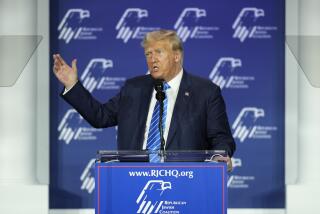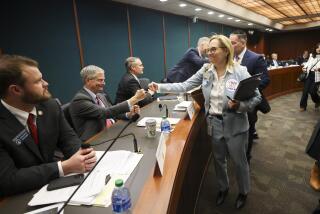Conservative Jews to Revisit Gay Issues
- Share via
The nation’s second-largest Jewish denomination is reconsidering its prohibition against ordaining gay men and lesbians and blessing same-sex unions.
The move, which is expected to revive a controversy over human sexuality, makes Conservative Judaism the latest major religious group to tackle the debate on homosexuality in the clergy. About 1 million American Jews are members of Conservative synagogues.
At least two major Christian denominations, the Episcopal Church and the Presbyterian Church, U.S.A., are confronting similar issues this year.
This summer, the Episcopal Church’s General Convention is expected to debate the establishment of rituals for blessing same-sex unions.
Presbyterians will hold a trial, starting next week in Kansas City, Mo., over a decision by denominational leaders on the church’s ban on gay ministers. Conservative Presbyterians say the leaders improperly blocked a special assembly that the conservatives hoped would strengthen the church’s position against homosexuality.
The debate within Conservative Judaism will focus on the movement’s chief lawmaking body, the Committee on Jewish Law and Standards. The rabbinical group that rules on the meaning of Jewish religious law is expected to discuss the issue until at least next year.
In 1992, the panel debated the issue and settled on an ecclesiastical version of the military’s “don’t ask, don’t tell” rule.
Under that arrangement, Conservative seminaries would not ask rabbinical students about sexual orientation, and students would not reveal it. Openly homosexual aspirants continued to be barred from serving as rabbis and cantors, though the committee called on synagogues, youth groups, summer camps and schools to welcome gays.
But the United Synagogue of Conservative Judaism, which represents the movement’s 800 U.S. temples, said that ruling left the status of gays unclear. Last month, the group asked that the debate be reopened.
“I’ve just felt there is some concern out there, in the lay world at least, about the status of homosexuals within our movement,” said United Synagogue President Judy Yudof.
The committee is expected to consult rabbis throughout the movement before trying to issue a ruling.
“Discussion about this issue and open disagreement about this issue is frankly called for,” said Rabbi Elliott Dorff, vice chairman of the committee and rector of the University of Judaism in Los Angeles. “To pretend this is a slam-dunk I just think is dishonest in either direction. If we ultimately agree to disagree, that would be fine,” he said.
That could mean that the committee would issue conflicting rulings, Dorff said, noting that a majority vote of the 25-member panel is not needed to make a ruling: All that is needed is six votes. Judaism has a long tradition of rabbis’ issuing conflicting rulings on the meaning and application of Jewish law.
Differing rulings could result in one Conservative seminary accepting openly gay and lesbian rabbinical students and another deciding not to do so. Likewise, some synagogues might choose to bless same-sex unions and others not.
Dorff and Rabbi Bradley Shavit Artson, head of the University of Judaism’s seminary, have spoken in favor of ordaining gays and lesbians. Rabbi Ismar Schorsch, head of the nation’s other Conservative seminary, the Jewish Theological Seminary in New York, opposes the idea. Rabbi Joel Meyers, head of the movement’s Rabbinical Assembly, says current prohibitions should stand.
“People who are from within the gay community themselves are treated just fine. There is no discrimination,” Meyers said earlier this year.
Elianna Yolkut, who is in her second year of rabbinical studies at the University of Judaism, said students, both straight and gay, will be closely following developments. Like rabbis, she said, students on the Los Angeles campus are of different minds on the issue.
Yolkut, who backs ordination of homosexuals, and 11 other rabbinical students formed a group called D’ror Yikra, Hebrew for “Call to Freedom.” She said the current policy has been difficult for gays and lesbians, and their straight supporters.
“We get to see the pain and the suffering of the students that have to be closeted when they come here, who both believe in the legal, binding nature and the divinity of the Torah, while at the same time fall in love with people of the same sex and don’t feel that should be a determining factor of whether or not they’re permitted to be rabbis,” Yolkut said.
Like Dorff, she views Jewish law as an evolving system that must conserve the framework it has inherited while carefully considering new circumstances. She said rabbis in the Talmudic tradition have always had the responsibility of interpreting the law so it remains vital.
“If it’s a tree of life,” she said, “we must, as a community of rabbis and leaders, address the issue so the tradition continues to be living.”
In taking up the issue, Conservatives confront the classical conundrum faced by virtually all faith traditions that revere Scripture as sacred: how to deal with tension between received tradition and the experience of contemporary followers.
Groups believing that Scripture must be taken literally, including fundamentalist Protestant denominations and Orthodox Judaism, say they are bound by biblical prohibitions against homosexual relations.
But like more liberal Protestant churches and the Roman Catholic Church, Conservative Judaism holds that Bible passages must be interpreted, not simply taken literally.
Dorff said he knows that, as an advocate of ordaining homosexuals and blessing their unions, he and others who agree with him must make the case to change the status quo. “I recognize this is a change in the tradition,” he said. “By our rules, the burden of proof is on me.”
Ideas about homosexuality have changed with each generation, he said, and a new generation has begun assuming leadership positions since the panel last dealt with the issue in 1992.
“More and more gays and lesbians have come out of the closet. More and more people now know gays, in some cases friends and in some cases members of their own family,” said Dorff, whose daughter is a lesbian. Gays and lesbians “are no longer the strange or threatening ‘other,’ ” he said. “They are, rather, people you know and love and whom you see as being equally moral as the straight people who are in your life.”
More to Read
Sign up for Essential California
The most important California stories and recommendations in your inbox every morning.
You may occasionally receive promotional content from the Los Angeles Times.













